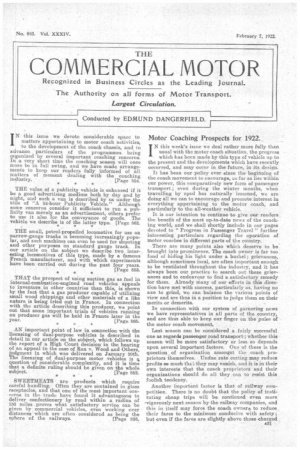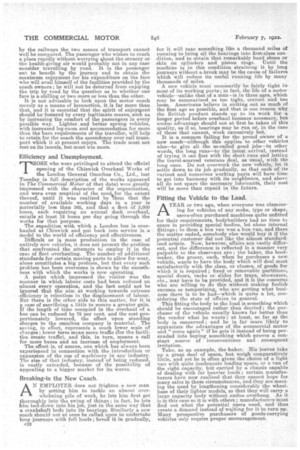Motor Coaching Prospects for 1922.
Page 1

Page 2

If you've noticed an error in this article please click here to report it so we can fix it.
IN this week's issue we deal rather more fully than usual with the motor coach situation, the progress which has been made by this type of vehicle up to the present and the developments which have recently occurred, and may occur in the future, in its design.
It has been our policy ever since the beginning of the coach movement to encourage, Le far as lies within our power, this comparatively new form of passenger transport; even during the winter months, when travelling by read has naturally lessened, we are doing all we can to encourage and promote interest in everything appertaining to the motor coach, and particularly to the all-weather vehicle.
It is our intention to continue to give our readers the benefit of the most up-to-date news of the coaching world, and we shall shortly include in our pages devoted to " Progress in Passenger Travel" further interesting particulars regarding the operation of motor coaches in different parts of the country. , There are many points also which deserve to be brought into prominence. The epoch owner is far too' fond of hiding his light under a bushel ; grievances, although sometimes local, are often important enough to be ventilated throughout the industry, and it has always been our practice to search out these grievances and to endeavour to find a satisfactory remedy for them. Already many of our efforts in this direction have met with success, particularly as, having no axe to grind, we can balance the various points of view and are thus in a position to judge them on their merits or demerits.
In connection with our system of garnering news we have representatives in all parts of the country, and are thus able to keep our finger on the pulse of the motor coach movement. .
Last season can be considered a fairly successful one as regards passenger road transport ; whether this season will be more satisfactory or less, so depends upon several important factors. One of these is the question, of organization amongst the coach proprietors themselves. Undue rate cutting may reduce profits so much the they may vanish, and it is in their own interests that the coach proprietors and their organizations should do all they can to resist this foolish tendency.
Another important factor is that of railway competition. There is no doubt that the policy of instituting cheap trips will be continued even more 'vigorously next season by the railway companies, and this in itself may force the coach owners to reduce . their fares to the minimum conducive with safety ; but even if the fares are slightly above those charged _ A31 by the railways the two means of transport cannot well be compared. The passenger who wishes to reach a place rapidly without worrying about the scenery or the health-giving air would probably not in any case consider travelling by road. It is the passenger out to benefit by the journey and to obtain the maximum enjoyment for his expenditure on the fare who will avail himself of the facilities provided by the coach owners; he will not be deterred from enjoying the trip by road by the question as to whether one fare is a shilling or two more or less than the other. It is not advisable to look upon the motor coach merely as a means of locomotion, it is far more than that, and it is essential that the spirit of enjoyment should be fostered by every legitimate means, such as by increasing the comfort of the passengers in every possible way. Lighter , and better sprung vehicles, with increased leg-room and accommodation for more than the bare requirements of the traveller, will help to retain for the coach the ascendency over rail transport which it at present enjoys. The trade must not rest on its laurels, but must win more.
Efficiency and Unemployment.
THOSE who were privileged to attend the official opening of the Chiswick Overhaul Works of the London General Omnibus Co., Ltd., last Tuesday (a full description of the works appeared in The Commercial Motor of that date) were greatly
impressed with the character of the organization,
and were even sceptical of the needs for the extent thereof, until it was realized by Them that the number of available working days in a year is materially less than 365, and that a fleet of 3,000 buses, each requiring an annual dock overhaul, entails at least 12 buses per day going through the works for that purpose.
The expedition with which a London bus is overhauled at Chiswick and put back into service is a model to the world of efficiency and effectiveness. Difficult as is mass production in the case of entirely new vehicles, it does not present the problem that confronted the attempts to employ it in the case of fleet overhauling. The number of additional standards for certain moving parts to allow for wear, alone constitutes a big problem, but that every such problem has been overcome is shown by the smoothness with which the works is now operating. A point which impressed the visitor was the manner in which labour costs had been reduced on almost every operation, and the fact could not be ignored that the aim at working towards extreme efficiency is relentless in the displacement of labour. But there is the other side to this matter, for it is a case of sacrificing a little to secure a greater gain. If the length of time occupied in the overhaul of a bus can be reduced by 75 per cent, and the cost pro portionately lowered, the effect upon standing charges to the omnibus company is material. The saving, in effect, represents a much lower scale of charges; lower fares mean more traffic (for the facilities create traffic), and this, in turn, means a call for more buses and an increase of employment. The effect is, of course, one which has always been experienced in connection with the introduction or expansion of the use of machinery in any industry. The size of that industry, instead of being reduced, is vastly extended, because of the possibility of appealing to a bigger market for its wares.
Breaking-in the New Coach.
AN EMPLOYER does not frighten a new man by setting him to tackle an almost overwhelming pile of work, he lets him first get thoroughly into the swing of things ; in fact, he lets him bed-crown into his job, just in the same way that a crankshaft beds into its bearings. Similarly a new coach should not at once be called, upon to undertake long journeys with full loads ; break it in gradually,
an
for it will tase something like a thousand miles of running to bring all the bearings into first-class condition, and to obtain that remarkably hard sheen or skin on cylinders and piston rings. Until the machine is in this condition straining it by long journeys without a break may be the cause of failures which will reduce its useful running life by many thousands of miles.
A new vehicle must necessarily•be fairly tight in most of its working parts; in fact, the life of a motor vehicle—unlike that of a man—is in three ages, which may be summarized as too tight, correct and too loose. Americans believe in cutting out as much of the first age as possible' and that in one reason why the British product stands up to its work for a• longer period before overhaul becomes necessary, but undue advantage should not at first he taken of this quality, as if so, bearings may be run or, in the case of those that cannot, work excessively hot. It is a Common failing for the proud owner of a new coach—although this applies to other vehicles also—to give all the so-called good jobs—in other words, the long runs—to the latest arrival, instead of trying it out first with the short runs and letting the travel-scarred veterans deal, as usual, with the long ones. Do not overwork the new vehicle, let it settle down to its job gradually, so that each of its various and numerous working parts will have time to get into harmony with its neighbours, and above all do not spare the necessary lubricants, their cost will be more than repaid in the future.
Fitting the Vehicle to the Load.
AYEAR or two ago, when everyone was elamouring for vehicles of any make, type or shape, userstoften purchased machines quite unfitted for their requirements, 'bodybuilders had no time to spare in providing special 'bodies, let alone internal
fittings ; to them a box van was a box van, and there the matter ended, somebody else would buy it if the potential customer did not like the almost standard ized article. Now, however, affairs are vastly differ ent, and the difference is reflected in a manner very palpable to the observant eye; the baker, the boot maker, the grocer, each, when he purchases a new vehicle, wants to have the body which will deal most satisfactorily with the class, or classes, of goods for which it is required ; fixed or removable partitions,
special doors, racks or slides for trays, showcases, etc., may have to bs provided, and it is the concerns
who are 'willing to do this without making foolish excuses or temporizing, who are getting what business there is to be had—which is quite a lot, considering the state of affairs in general. This fitting the body to the load, is something which _
should be encouraged rather than decried.; the purchaser of the vehicle usually knows far better than
the vendor what he wants ; at least, so far as the body is concerned; and he is far mare likely to appreciate the advantages of the commercial motor and "come again" if he gets it instead of being persuaded into buying something which proves a constant source of inconvenience and consequent irritation.
Take, as an example, the baker. His leaves take up a great deal of space, but weigh comparatively little, and yet he is often given the choice of a light van with quite inadequate loading space, or a van of the right capacity, but carried by a chassis capable of dealing with far heavier loads ; certain manufac turers have now realized that they cannot hope for many sales in these circumstances, and they are meet ing the need by lengthening considerably the wheel base of their lighter models, so that they will carry a large capacity body without undue overhang. As it
is in this case so it-is with others; manufacturers inust find out what the potential users need, and thus create a demand instead of wieiting for it to turn up. Many prospective purchasers of goods-carrying vehicles only require proper encouragement.




























